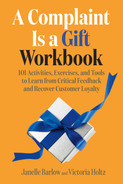CONCLUSION
Next Steps
Wow! You did it. You’ve gone through this workbook. Congratulate yourself! We congratulate you! We know it isn’t easy to conduct your daily work obligations and cover a topic as large as complaint handling. As you have no doubt discovered, the matter of complaint handling is a gigantic subject. It touches and is touched by many related business topics.
You can’t do everything. The critical question right now is, What are your next steps? Below you’ll find some ideas you can easily follow.
• Follow a rough pathway—If you read this book while using a highlighter, you can probably see a rough pathway of ideas that will continue to reinforce the A Complaint Is a Gift mindset. That pathway would include repeating the concepts and techniques that you will follow until they become second nature to you.
• Appreciate the value of the CIAG mindset—You have no doubt figured out that your mindset affects you, your customers, and your colleagues. Every time you practice the techniques and ideas you intend to make part of your complaint-handling process, you will also be reinforcing the A Complaint Is a Gift mindset. And that’s a decisive step, no matter how you do it.
• Consider your role in your organization—Part of your next steps will depend on your role in your organization. We are mostly writing these next steps for individual CSRs. As a CSR, you are probably more interested in focusing on how to deal with complaining customers. Managers will want to encourage their CSRs to practice the best complaint-handling techniques in this workbook. Leaders of organizations should look to create a service recovery map. We encourage managers and leaders to acquire A Complaint Is a Gift, third edition. It covers some of the same topics in greater depth and introduces relevant ideas to your leadership positions.
• Keep practicing the Gift Formula—A careful reading of chapter four will teach you about the Gift Formula, and its practice will anchor the concept of the A Complaint Is a Gift book and this workbook. It’s a central focus of this book. Once you have developed a habit of always thanking others for their feedback, you’ve got the basics.
• Review your progress on this complete CIAG topic—Return to the workbook from time to time (perhaps once a month) and glance at the answers that you shared here. It’s easy to forget that complaints are gifts after dealing with a string of difficult customers.
• Complete the activities in the chapter on difficult customers— Most CSRs have some customers who are challenging. Some CSRs have a lot. But everybody will face challenging feedback and complaints at one time or another. It’s good to be prepared.
• Be ready to be empathetic—It’s challenging to turn empathy on or off like a switch. Be ready to develop your empathy so it’s constantly there. Learn to recognize the six basic emotional displays we all make on our faces—everywhere worldwide.
• Keep practicing your questioning and listening skills—This will help you in all parts of your life. They work particularly well in the field of complaint handling.
• Continue studying body language—There is so much going on when someone complains, whether in our personal or business lives. Learn how to read the subtle language that the truth of our bodies communicate.
• Choose powerful phrases and make them your friends—We provided you with pages of powerful phrases. No doubt there are several that are not part of your everyday lexicon. Start using them. Once you find yourself saying them without thinking, add a couple more. They are powerful!
• Take care of yourself—Customer service is not easy work. It takes energy, and without a strong body to move through your day, you run the risk of burning out. Nobody wins when that happens. But it’s not necessary to become overstressed. It’s a decision you make to take care of yourself. We wish that for you.
• Pay attention to giving and receiving personal feedback—Feedback helps us grow, just as complaints help businesses improve. Most of the ideas from this workbook are as relevant to our business life as our personal life. Start saying “Thank you” to everyone who offers you feedback. You’ll be amazed how it reduces people’s fights with each other.
Complaints involve emotional intelligence that must be applied to each unique transaction with another person. With a well-established mindset about complaints, you can appreciate how the complex nature of complaint handling requires a broad understanding of emotions. It is lifelong learning because psychologists continue to reveal a deeper knowledge of human interactions. This continuous learning is part of your individual next steps in the world of complaint handling.
